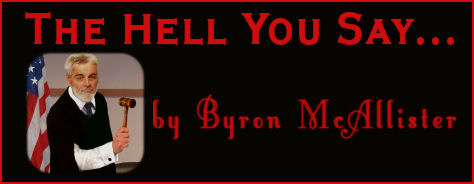"Canons to the Right of Them,
Canons to the Left of Them..."
I don't suppose I can speak for all earlier generations, but, when I was young our teachers had a problem persuading us to forsake comic books for great literature. The problem lay at least partly in the fact that great literature is somewhat hard reading. That it's also difficult to define only added to our teachers' burden. There were indications that we were just typical of what had been going on forever, although the particular desperados in our generation seemed to be the comic books. My experience during those previous generations was, of course, zero, so I'm only referring, as I already expressed it, to “indications.” What my grandparents' generation read that they needed to be weaned from I can't really say: maybe they were reading what, by my own school days, had become great literature, and maybe their parents had wanted them to spend more time with the Bible? Can't say. But in our case, they gave us assignments using Tennyson, Shakespeare (often slightly simplified), and all that. And, of course, we read them. Gradually we came to know what the classics were, even if we did interlard them with a certain amount of contemporary writers' output, from “The Three Policemen of Farbe Island,” “The Wizard of Oz,” “Treasure Island,” and so onall at various stages of development, of course, and perhaps realizing that some of what we were reading was, indeed, classics. Or, perhaps not, again depending heavily on our stage of development.
Well, why should we read “classics,” anyway? I don't suppose anybody ever spelled out a reason, but I think I've figured it out, as time flowed inexorably by. Probably because it was supposed that there's a certain background that everybody ought to have in order to facilitate communication with others sharing a somewhat similar background. If we didn't have a considerable overlap in our reading background, if our reading choices were utterly uninfluenced by others, we'd lose the chance to say “Oh, yes, sort of an Ophelia,” about some nutcase we and our co-conversationalists all recognized.
Did it work? Well, you might say so. If A mentions Shakespeare to B, who prefers Mickey Spillane, at least B will know who A is talking about, whether he thinks A is being a bit hoity-toity or not. It's a partial success.
Several whole literary movements have grown out of this meager success. For a while, we had people trying to establish a definite “canon,” a set of books every educated person has read, so that we could be certain we all had a common background. I haven't heard of this movement for a while, but I don't suppose it has gone away. At least one of its proposers had a vested interest in establishing such a canon, emphasizing especially books he had already chosen (and participated in producing special editions of). Clearly, he said, a canon is needed. Some thought the basic idea was sound, but wanted to be in on choosing the canon fodder.
A radical branch of the canon crowd felt that the choice had already been made, and felt it had been made quite wrongly. They used the expression “dead white males” to describe the writers they wanted written out of the canon, because the standard suggestions for the canon didn't include enough females, didn't include enough blacks (they also bowed, some of them did, to American Indians), and didn't include enough contemporary authors. I don't recall ever hearing that they agreed on whose work we should read, but maybe they did. Again I don't know whether this movement is still alive; I don't seem to be reading enough literary criticism, or whatever it is I'd have to read in order to keep track of such things
Recently I've noticed a tendency to demand that everybody have the same background, or, at least similar background in everybody's “reading.” It neither establishes a canon of classics (we'll come back to that, briefly) nor a hit list of exposures to be avoided. In short, a lot of people have abandoned the “writers” concept of common educational items and tacitly demand that everybody watch basically the same television shows. Chatter at cocktail parties (if there is still such a thing as cocktail parties) nowadays can't really drift to Shakespeare, Tennyson, L. Frank Baum, Norman Mailer, James Thurber or Edna St. Vincent Millay. Perhaps I only imagined that it ever did.
What it can drift tobesides sports, of course, but that topic was always in the competition, as was common gossip, is a popular television episode, normally part of a series. This change (yeah, I know: “if it is a change”) should satisfy both the canonizers and the anti-dead-white-male crowd, since there are few enough programs in the limelight at any one moment that there will be lots and lots of overlap in viewing for people to talk about, and since the writers are almost universally ignored, so that their whiteness or maleness doesn't stand out and their deadness is at best uncertain-indeed unlikely.
See, Pangloss was right: we live in the best of all possible worlds. Just of the possible ones, of course. (Whaddya mean who is Pangloss? Have you been watching too much television or reading too many comic books?)




